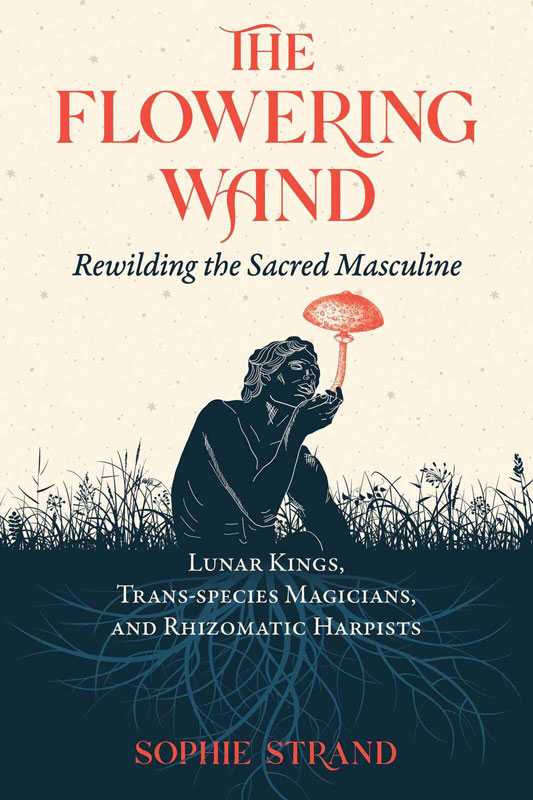author
Jacques Lawinski
post
- 13/02/2024
- No Comments
- Reviews
share
The Flowering Wand: Re-wilding the Sacred Masculine
By Sophie Strand
Inner Traditions, 2022.
Sophie Strand is a writer based in the Hudson Valley who focuses on the intersection of spirituality, storytelling, and ecology. Her website is here.

Through exploring several myths from Western cultures, Sophie Strand looks at how masculinity has been constructed and interpreted throughout Western history. She explores how we might reconstruct ideas of masculinity using these very same myths, if we allow the men that feature to express multiple sentiments, and hold roles other than heroes and villains.
The book is structured into many small chapters, each exploring a different character or aspect of myth. The writing is fluid and metaphorical, yet is full of great turns of phrase to point out what is going wrong, or what we must change. The heart of the book is to allow men the space and the stories to realise that they can break out of the conventional narratives of masculinity. “Stepping out of dominant cultural narratives involves a process of grieving, tending to our losses, and transforming our dreams. This doesn’t happen in an hour. And it can’t be gamed.” P. 88.
In the first chapters, the difference between the sun, and the earth, or spores, is explored. Strand writes, “Sky gods think sunshine, abstraction and ascension are the answer to everything. But the problem with the sun is that if it isn’t tempered by darkness and rain and decay, it tends to create deserts instead of biodiverse ecosystems. […] Sky gods encourage linear thinking. Spore gods teach us that everything is cyclical.” P. 23. By changing where we look for our gods, we might learn different things about the world, and about who governs us.
Strand also writes about healing and the way that we have constructed a narrative of healing which rules out some of the necessary processes to true healing.
“So much of the current rhetoric about healing is wedded to progress and to narrative. But the body is not a story. It is porous and complicated and changeable. It needs to dance and to swim. It needs to lie on the ground for days, re-regulating its nervous system to the seasonal heartbeat of the soil. The concept of “healing” has become the time-sensitive demand of a culture bent on progressing, and unwittingly taken up by wellness and new-age spiritual communities. They say we must be “integrated” and whole again; we must achieve functionality so that we can keep the narrative moving. But a body doesn’t need to move through healing. It just needs to move. And then it needs to be still. And it needs to feel safe.” P. 94.
Stillness, safety, care and attention are common themes in the book, with Strand often encouraging readers to find this time and space to consider alternative options to the stories of manliness that we may inhabit or reproduce.
One of the pieces of advice that Strand gives is to men who are ready to take a step towards letting go of these narratives. She says, “As men move into new modes of the masculine and sense that it is time to shed an old skin, to heal a wound from the bottom up, they need only step outside and request tenderly, “Please hold me during this time. Please move me slowly and lovingly into newness.” P. 89. I can imagine myself saying this, and men should have more confidence to ask for help, not from others specifically, but from all of life, to help them to change, to morph, and to reinvent themselves.
This is not a book that would interest everyone, but for those who are questioning the current narratives of masculinity, or those men who are beginning to realise that there are other ways of being a man, it is a good introduction into some of the practices and questions we could be asking ourselves.
The Flowering Wand is available at Paper Plus, or check out your local bookshop to see if they have it in stock or can order it for you.
We need inspiration from many different sources. Reading is one way to learn more about different points of view.
All our articles are freely accessible because we believe that everyone needs to be able to access to a source of coherent and easy to understand information on the ecological crisis. This challenge that confronts us all will only be properly addressed when we understand what the problems are and where they come from.
If you've learned something today, please consider donating, to help us produce more great articles and share this knowledge with a wider audience.
Why plurality.eco?
Our environment is more than a resource to be exploited. Human beings are not the ‘masters of nature,’ and cannot think they are managers of everything around them. Plurality is about finding a wealth of ideas to help us cope with the ecological crisis which we have to confront now, and in the coming decades. We all need to understand what is at stake, and create new ways of being in the world, new dreams for ourselves, that recognise this uncertain future.
Copyright © Plurality.eco 2023

